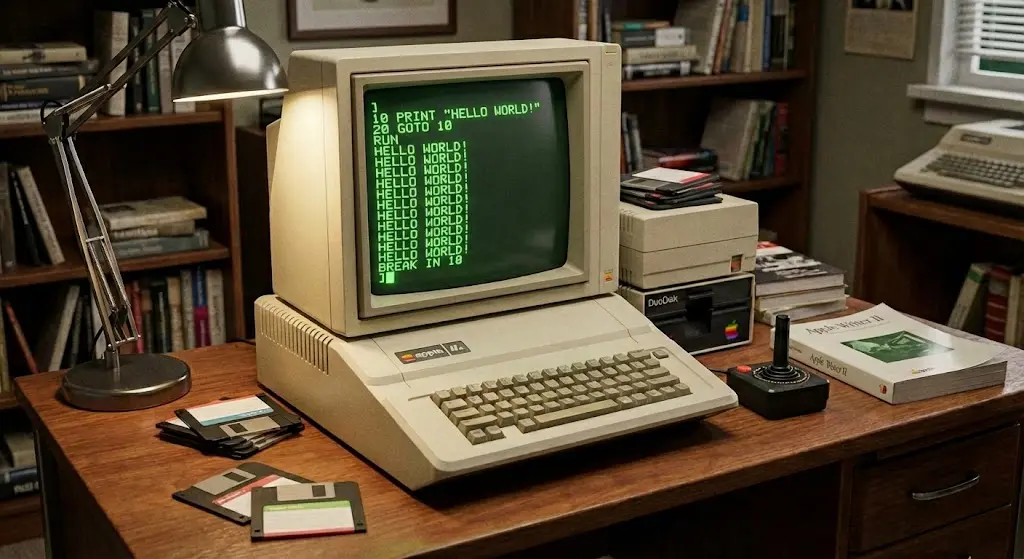This article is a prose version of the video. I started with the transcript of the video, edited it for clarity, had an AI convert it into prose that read cleanly, and then edited and added to that output. This disclosure is per the site’s AI Use Disclosure policy.
In this article, I recall a pivotal moment from my teens—when I developed a series of improvements for the Apple IIe’s operating system but never showed them to Apple due to copyright concerns. Below, we look at how misunderstandings about copyright law can stop promising innovations in their tracks.
1. A Teenager’s Big Idea
- Modifying the Apple IIe
In eighth grade, I disassembled the Apple IIe’s OS and made sweeping changes in 6502 assembly language. I found ways to make the system more user-friendly—improvements I was proud of. Some were quite simple: Instead of typing “brun” to run a binary file or “run” to run a basic file, you could type “run” and the system would figure out what you meant. Others were more complex. - Why the Hesitation?
Unsure whether reverse-engineering the OS violated copyright, I chose not to share my modifications with Apple. I worried about legal repercussions, despite having no plans to commercialize the altered software. Ironically, the DMCA anti-circumvention provisions make this kind of modification illegal or at least legally quite risky today — but this was decades before the DMCA.

2. Understanding “Derivative Works”
- What Is a Derivative Work?
Under U.S. copyright law, if you base a new work on someone else’s copyrighted material, that new work can be considered “derivative.” Typically, you need the original copyright holder’s permission to distribute or sell it. - My Dilemma
I recognized his modifications were likely a derivative work, although I didn’t know that term of art back then. Although I wasn’t selling the software, I feared legal trouble even for having altered Apple’s code.

3. The Legal Landscape, Then and Now
- Pre-DMCA Era
At the time, the Digital Millennium Copyright Act (DMCA) didn’t yet exist, and reverse-engineering for compatibility or innovation had much lower risk, and was generally not pursued as copyright infringement. This led to a golden age of learning, where people like teenage me were able to disassemble programs and learn how to program by doing that. - DMCA Anti-Circumvention Rules
Today, the DMCA prohibits bypassing technological measures designed to protect software. While some exemptions exist (for research or interoperability), the legal environment has become complex.
4. Missed Opportunities
- Never Sent to Apple
Concerned about copyright violations, I never submitted his improvements to Apple—potentially missing out on early collaboration, recognition, or even a job offer at a growing tech giant. - A Lesson for Inventors
Sometimes, fear or misunderstanding of IP laws can deter inventors from sharing their work. In many cases, a simple inquiry or consultation with an IP attorney could clarify rights and open new doors. Sites like this one seek to provide a baseline understanding of the law, enabling creators to operate within a framework they are aware of. While legal advice is still key, the lack of easy information about the law in “my day” combined with a lack of funds to hire a lawyer was a dream crusher.
5. Key Takeaways
- Knowledge Is Power
Understanding copyright law—especially how it applies to software modifications—can help you decide when (and how) to share your innovations. - Derivative Works Require Caution
If your invention relies on someone else’s copyrighted material, consider seeking permission or legal advice to avoid infringement. - Don’t Let Fear Stop You
While legal uncertainties can be intimidating, missing a chance to collaborate or license your ideas can be just as costly.
Want More Details?
Check out the accompanying Innovation Cafe video to hear Gary Shuster’s firsthand account of how copyright concerns reshaped his journey—and why being overly cautious can sometimes mean losing big opportunities.
